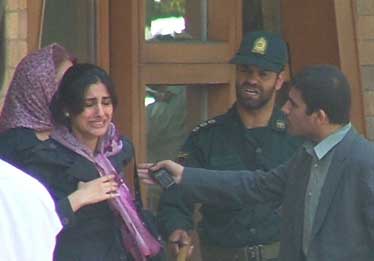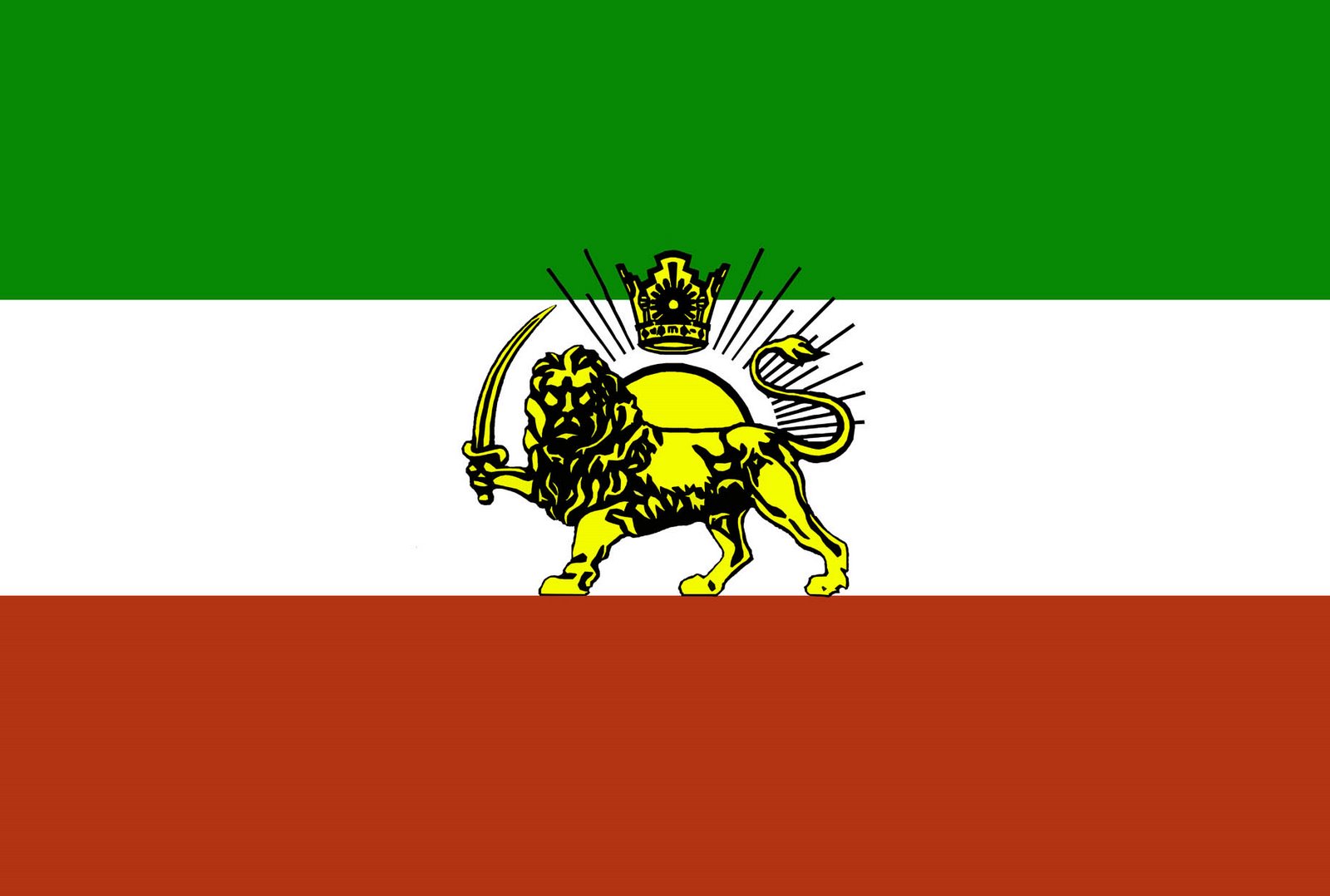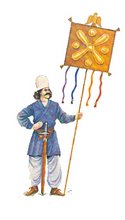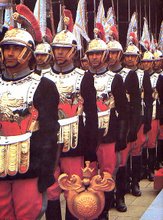Since I only recently started blogging i'd like to catch up in here and post some interesting articles from previous years.
When he was 14 years old, his father, was diagnosed with lymphoma. As a result the teenage prince had to over-mature prematurely. He was snatched away from the culture in which his peers would normally immerse and thrust into a monarchical apprenticeship, which included state missions to Egypt and England.
A mere four years later his father died in Egypt. Reza Pahlavi struggled to fight back tears, as tearful distressed Iranian nationalists gathered around him in Cairo to wtiness him taking the oath of responsibility as legal claimant of the Iranian throne.
In 1980, when the Iraqi dictator Saddam Hussein tore up the treaty he signed with his father five years earlier, Prince Reza sent a telegram to General Velayatollah Felahie, the Chief Commander of the Iranian armed forces, offering to serve in the Iranian airforce as a fighter pilot to defend his nation. The Ayatollahs turned down his offer, as his presence would have contradicted their Orwellian re-writing of Iran's history.
Twenty two years later, Prince Reza Pahlavi, looking more and more like his father, still offers his service to his nation. He looked, a little more tired, than the last time I met him, early last year, in the same modest central London hotel. The staff clearly adore him and welcome the growing number of supporters, from among London Iranian community.
Despite his cold-generated cough, the prince spoke enthusiastically for almost two hours, about his vision of Iran and the progress of his campaign for democracy in Iran, whicj he discussed in an interview with the Middle East last year.
Commenting on what his mother Empress Farah Pahlavi, told London Arabic daily Asharq Al-Awsat two days earlier - that her son wants to return and serve his country like any ordinary citizen- the Shah in exile sys the important thing is that the people of Iran are given the right to chose how they wish to be governed. Whether the future for Iran involves a republic or constitutional monarchy, is not the issue at this time, he says. The first aim shold be for the wishes of the Iranian people to be recorded in a free and fair election.
"My mission in life, from the day I started 21 years ago, remains the same, " said the man who most Iranian liberals in exile, as well as an increasing number of Iranians at home, consider him to be the hope of salvation from what many describe as its current nightmare.
He outlines his vision for a comprehensive strategy to give Iranian people freedom of choice and real democracy, in his book, " Winds of Change: the Future of Democracy in Iran" published feb 2002 in Washington by Regency Publishing Inc., which he dedicated to the memory of all Iran's fallen heroes and patriots.
" My goal is to reach a stage when the Iranian people can go to a national referendum and vote their conscience and vote for their future. That day, the day the Iranians go to the polls, is the end of my mission in life. What they want to do afterwards is entirely up to them and I stand ready to serve them in whatever capacity that they see fit. "
"It is simply important that believers in secular democracy come together to achieve that goal."
Prince Reza's opinions are shared by growing numbers of people inside the Islamic Republic, where, increasingly,the rallying cry is for secular democracy.
In 1997, when the voters elected philosopher Mohammed Khatami, thought by the West to be the most liberal candidate the ayatollahs could stomach, the idea of an Islamic democracy - although unworkable in practice - held great promise. With his talk of a 'dialogue of civilizations' Khatami caught the imagination of the Iranian public and Western journalists. John Lancaster of The Washington Post called him 'yatollah Gorbachev', prompting debate as to whether he would usher-in Iranian Perestroika, or he was just a reformer, not a revolutionary. Many Middle East specialist now say he is neither; Khatami was, after all, trained in the conservative seminaries of Qum and is part of the regime, a point Reza Pahlavi capitalises on to , warn us - western, journalists and governments- against a trap that we might fall into and " betray the Iranian people, who deserve better as they themselves have scratched the surface of Khatami's reforms and uncovered the truth."
" This good cop, bad cop game was a carefully designed tactic by the Islamic regime to confuse the outside world into some kind of an appeasement," he said.
He dismisses the idea of a moderate Khatami intent upon bringing about real change. Any change, syas Reza pahlavi, would be superficial to help lift US sanctions or improving trade to serve the interest of the ruling elite, and not for the benefit of millions of impoverished Iranians.
"There is no such thing as a moderate in this [theological Islamic Republic] system." He takes a leaf from Europe's own painful history book: " we saw it with Nazis, some people were arguing that Ribbentrop was more moderate than Himmler but they were [both] Nazis at the end."
In that sense, Says Prince Reza, Mr. Khatami loyalty is to the regime, his allegiance is to the constitution, the only written constitution in the world that rejects popular sovereignty. "We see, under this so-called moderate system and reformist president, parliamentary members being incarcerated; most of the Iranian newspapers shut down, and political prisoners. The popular rhetoric is really aimed at confusing the outside world. The struggle in Iran today is not about the moderate camp versus the radical camp," he went on, "rather it pits the forces of state despotism and religious fundamentalism against a nation that demands democracy, rejects militant fundamentalism and relgious domination and repudiate the concept of a supreme leader who rules over the others by a divine law."
In evaluating the progress of his year campaigning and calling upon his people to use " non violent means and general civil disobedience to force change," Reza Pahlavi cited few examples from inside Iran, in addition to Last November demonstrations.
The candle-lit vigil held by many Iranians, men and women of all ages and all walks of life, on the night of September 11 for the American victims, was a liberal phenomenon using western Christian symbols, like candles, in defiance of the regime and risking arrest by the revolutionary guard.
"Iran," commented the prince," is the only country in the area where the majority of the people show sympathy to the West but the regime is hostile to it." It is important for the world, he said, to separate the Iranian people from their unpopular ruling regime.
He cited several examples, such as Iraq and Afghanistan: " when the Taliban left Kabul, we immediately saw women taking off their Buqas, the radio began broadcasting music and songs. Similarly, when the East German government fell and the Soviet system fell, there was great rejoicing. "what was the true sentiment of those nations before the change ?` he asked, " this is exactly what you would see in Iran... as a matter of fact we see it today."
He says September 11 was, and should be an eye-opener for the west and particularly for America. " The tragedy caused the decision making circles in the west to evaluate its short-termism and began consider its long term interests."
" Who in the west, before September 11 , gave any thought to the suffering of the Afghani people? Afghanistan was not on any list of western priority, let alone Western public opinion"
The 11 September events were a painful lesson to be digested by the west, he sai. " Eradicating terrorism needs detailed long term strategy and continues efforts."
He warns that terrorism will not disappear by jailing people like Carols the Jackal, killing bin Laden and destroying the bases of Al-Qaedah and Hizbullah. " It is essential to deal with the root- causes, confronting regimes that supports terrorism, and addressing the factors that create the culture, exploited by twisted-mind clergy and the likes of bin Laden to brainwash the young into becoming suicide bombers."
Interestingly, he reminded historians how the Islamic suicide-bomber phenomenon, only emerged with Ayatollah Khomeini's revolutionary doctrine.
Prince Reza believes thatthe painful lessons of history show that true democracy is the only basis for any lasting political solution." By spreading democracy and ending social, political, and economic injustice, by encouraging religious tolerance, social justice and fighting poverty in our Muslim countries, we can secure our societies and protect them against the tied of fundamentalism and terrorism recruitment movements," he explained, while listing the ingredients of his long term recipe for eradicating terrorism from the Islamic world.
The Iranian regime responded to September 11 events with typical ambivalence; condemning the terrorists, after the vigils were held by the people but saying that the United Nations, not the United States, should lead any war on terrorism.
Yet the truth, which is recognised by Reza Pahlavi, is that ordinary Iranians aren't much bothered by events in Afghanistan, even though Iran's hard-line media plays up reports of civilian casualties.
His contacts inside Iran, which he claims continued since the family left the country in 1978, are growing in size, providing him with news of what is going on there. His website, Prince Reza confirmed, had scored several million hits, mainly from inside Iran, during the 10 months since we last met, and he has also recieved hundreds of thousands of personal e-mails from inside the coutry.
"The people of Iran can use a much-needed boost of support from the free world," Reza Pahlavi said in a speech at Yale University, Just five days before the demonstrations in which participants chanted his name in Iran last November. "They especially look to America as a beacon of hope, expecting her not to let them down by cutting a deal with the rulers of Iran for short-term gains."
A report in The Wall Street Journal last November indicated that the young Iranians, who form majority of the population today, were curious and somewhat intrigued by the man whose father died in exile years before they were born, and of whome the have only recently learned details.
"He [Reza Pahlavi] says we need freedom. He says we'll be like Europe," as 17-year-old Afshin Sadeqi, one of the teenage multitudes in Teheran's streets last November told Hugh Pope and Peter Waldman of The Wall Street Journal. The young student had never heard of Reza Pahlavi until last October, when he saw him speaking on videotape. "We didn't know who he was," Mr. Sadeqi says. "But as soon as we heard him, we felt it was our own words that we couldn't say. He said them beautifully."
The protesters' taunts directed at Iran's clerical leadership were astonishing, the WSJ report continues, particularly these: "We love you, America," and "We love you, Reza Pahlavi."
"Until a month ago, nobody knew who Reza Pahlavi was," says Mr. Havaji, a 38-year-old civil engineer. "We Iranians want to be players in the global village, and his [Westernised] character fits this picture very well. When he says we just want to be normal again, this touches everybody. Our society has decided to become a secular democracy."
Reza Pahlavi described to me how the Clergy regime, after such reports were published, sent their police around the houses confiscating satellite dishes.
His advice to his fellow Iranians, on his website and via his broadcast is to smash their dishes to stop the corrupt elements of the regime reselling them their very own ' confiscated' dishes back a few months from now at inflated prices. Such advice rang true with th local people and revealed Prince Reza not only as a man who cares, but one who knows exactly what goes on Iran, despite living in exile.
Taking a few sheets of paper out of the inside pocket of his smart suite, where he scribbled many notes in Farsi, Prince Reza's eyes lit up; he grinned from ear to ear as he translated a selection of the slogans used by demonstrators against the regime in several demonstrations held in late January - one of which coincided with a visit by UN Secretary General Kofi Anan - and others chanted by students demonstrating in support of their teachers, who also demonstrated for better conditions a day earlier.
" The Taliban faces has to be extinguished " was one of the slogans comparing the clergy to the Taliban, " Leave Palestine alone and attend to our needs," said another; " your media is not saying enough about us," critocised another. Yet more, including " You incompetent must resign" and, " enough we are tired of 20 years of betrayal," could hardly have been more direct in their criticism.
Prince Reza will be looking to a variety of Iranian groups for support to bring about democratic change; they include the intelligentsia, the professional class, an increasingly alienated large sections of the clergy including many Islamic scholars, weary of the theological autocratic elite who, they belive, have isolated them from the people. Last but not least, he will be looking for the support of the bazaaris or merchant- class, whose desertion of his father dealt a fatal blow to his ruling regime.
Mr. Pahlavi, says Franklin Foer in The New Republic, has carefully crafted his appeal to Iranian youth, by far the country's most dynamic political force. His comments are laced with references to their frustration, which he seems to have adroitly adopted as his own.
Reza Pahlavi said that "the message from [Iran's] 50 million young is that an investment in the people of Iran and their rightful struggle for secularism and popular sovereignty is the best guarantee against continued regional instability and radicalism emanating from Teheran."
He also championed women's rights, regarded as the Islamic regime's Achilles' heel. When asked about women's rights by a caller from Iran in a recent two-hour interview on satellite TV, he said, "Women's rights are human rights ... Under the clerics, however, the Iranian women have suffered the most by having been subject to the most humiliating social restrictions and laws."
Several reporters who have visited Teheran in recent months cited another sign of Reza Pahlavi's sresurgence: The Islamic government fears him. His recent statements condemning the regime's human rights record have evoked apoplectic responces from ayatollahs in the government-run newspapers. The mullahs have even vigorously protested former King Zahir Shah's return to Afghanistan because, Iran watchers argue, they worry it might set a precedent for Pahlavi. While there are several other opposition figures, according to analysts, those reporters come back saying many people started perceiving Reza Pahlavi as the only credible alternative to the ruling regime.
Cyrus Kadviar, a London based Iranian businessman says that the young today hear their parents talk about the days of the late Shah, about the prosperity and the choices they had, choices of which todays youth are deprived. " They simply tell their children that the older generation, made a terrible mistake, by getting rid of the Shah, which they now regret."
Mr Kadivar too heard from his father how in 1960 the Shah was very close to his people, as his 'white revolution' gave the Iranians hope of fast progress, prosperity and generous welfare, and there was no sign in the horizon, at that point, of the flood that was to drown the nation 17 years later. Distinguished Journalist and historian Dr Ali Nouri zadeh, says the years of Reza's growing up, were associated, in the minds of the Iranians, with the years of prosperity and progress.
He recalls how, in November 1960, thousands of Iranians flooded the streets around the " Mother and Child Maternity hospital, within minutes of Teheran radio announcing that Empress Farah, the third wife of the Shah, has given birth to a healthy male, named Prince Reza.
"The late shah had separated from his first wife, Princess Fawziyah of Egypt, after giving birth to one daughter Shahenaz, then he had to divorce Sorya who couldn't medically have children, the people of Iran have been waiting many years for the birth of a son to succeed his father to the throne to secure the continuity of the monarchy. Prince Reza's birth was greeted by much rejoicing." Dr Nouri zadeh said.
Four decades later, Iranians are again gathering in the streets, calling out the name of Prince Reza. Could the Iranians be waiting for a rebirth of Reza Pahlavi to start another white revolution, this time based on full democracy?











